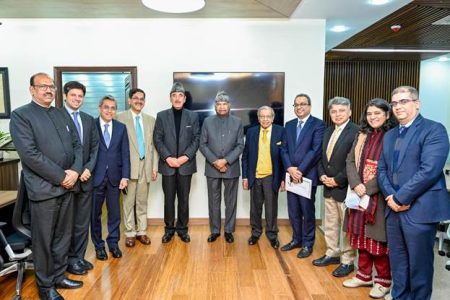New Delhi: The High-Level Committee (HLC) on One Nation One Election, headed by Shri Ram Nath Kovind, former President of India, continued its deliberations today with a delegation from the Federation of Indian Chambers of Commerce and Industries (FICCI). The committee is exploring the feasibility of simultaneous elections across the country.
The FICCI delegation, comprising Dr. Anish Shah, President, Shri Harsh Vardhan Agarwal, Senior Vice President, Shri Anant Goenka, Vice President, Shri S K Pathak, Secretary-General, Ms. Jyoti Vij, Additional Director-General, and Shri Anshuman Khanna, Assistant Secretary-General, presented their views before the Chairman and members of the HLC. The committee includes Shri Ghulam Nabi Azad, former leader of the opposition in the Rajya Sabha, Shri N K Singh, former Chairman of the 15th Finance Commission, Dr. Subhash C. Kashyap, former Secretary-General, Lok Sabha, and Shri Sanjay Kothari, former Chief Vigilance Commissioner.
During the presentation, FICCI expressed its support for the concept of One Nation One Election. The delegation emphasized that conducting multiple elections at various levels has adverse effects on the ease of doing business and can lead to a slowdown in decision-making processes. FICCI argued that the implementation of simultaneous elections would not only streamline the electoral process but also result in significant cost savings.
FICCI further suggested that the financial resources saved from holding simultaneous elections could be redirected towards government spending. This, in turn, could be utilized to promote economic growth and generate livelihood opportunities, aligning with the government’s efforts to boost the nation’s overall development.
The HLC, appreciating FICCI’s perspective, continues to gather insights from various stakeholders as it works towards formulating recommendations on the One Nation One Election proposal. The committee aims to present a comprehensive report that addresses the concerns and aspirations of different sections of society while promoting the principles of efficiency, governance, and economic development.

